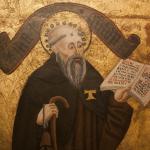
Julian of Norwich’s spiritual experiences led her to question her own understanding of God. On the one hand, she did not want to deny the value and truth contained in traditional representations of God, but on the other hand she found how she understood them often contradicted what she learned about God and God’s nature. At the forefront of her experience was the realization of God’s love and what it means for God to be love. When she appreciated God’s love, she realized, contrary to the way God is often presented, that God is always at work for us and our good, and it was this reason she was able to say God will make all things right in the end. Likewise, she came to see that whatever we experience as God’s anger, in reality, must not be such, for God cannot experience anger:
For it was a great marvel, constantly shown to the soul in all revelations, and the soul was contemplating with great diligence that our Lord God cannot in his own judgment forgive, because he cannot be angry – that would be impossible. For this was revealed, that our life is all founded and rooted in love, and without love we cannot live. And therefore to the soul which by God’s special grace sees so much of his great and wonderful goodness as that we are endlessly united to him in love, it is the most impossible thing which could be that God might be angry, for anger and friendship are two contraries; for he dispels and destroys our wrath and makes us meek and mild – we must necessarily believe that he is always one in love, meek and mild, which is contrary to wrath. For I saw most truly that where our Lord appears, peace is received and wrath has no place; for I saw no kind of wrath in God, neither briefly nor for long. For truly, as I see it, if God could be angry for any time, we should neither have life nor place nor being; for as truly as we have our being from the endless power of God and from his endless wisdom and from his endless goodness, just as truly as we have our preservation in the endless power of God and in his endless wisdom and his endless goodness. [1]
Julian did not deny that we will experience some sort of judgment, and with it, possibly experience what is traditionally understood as the wrath of God against sin; however, she pointed out that such experience does not truly present the reality as it is contained in God. For God is love, and as such, loves us and does judge or condemn us: God only works to lift us up so that we can experience that great love for ourselves. And yet, if she is to accept tradition, as she did, she seems to be left with a paradox, one which tries to understand how tradition can and does present such an image for God while God by nature cannot truly be seen to be such. Much of her writings reflect this paradox, showing her attempt to engage God as the God who is love while finding the truth contained in traditional representations of God. It could be said that her faith, in the process, underwent a deconstruction and reconstruction. In the deconstruction, she found what remains was God’s love, and through that foundation, she rebuilt her faith and her interpretations of the faith, and in doing so, offer us the means to do so for ourselves.
Julian highlighted something important for all of us to consider. God is love. Even if we have not experienced it as she did, Christians should acknowledge this on the basis of Scripture, that is, general revelation (cf. 1 Jn. 4:7-21). However we understand God’s actions towards humanity, we must do so in such a way to underscore God’s love. Sin, on the other hand, is unacceptable, and it is unacceptable because it comes from our resistance to love. Our sins, actions which represent unlove, as it were, create their own effects, and it is in this way that sin can be said to be its own punishment. When we talk about God punishing us for sin, and with it, God’s anger over sin, we must understand such language as representing a poetic descriptions representing the experience we have as a result of our sin, experiences which sin creates for us, not God. Forgiveness, in this regard, is also a poetic description, representing the experience of grace as it heals us from all the suffering which sins has brought upon us.
Love is the foundation which we need. God is love, and for us to receive what God has to offer, we must sift away all that is unlove in our lives. We come to know ourselves only in the light of love, and then by knowing ourselves, we can then come to know God in whose image we have been made. Thus, as Ficino tells us, true religion is tied to love: “Indeed, creation is so ordered that there is no true love that is not religious, nor is there any true religion but that sustained by love.” [2] The commandments of God are the commandments of love, made to help us overcome all unlove so that we can experience the love of God for ourselves:
All these commandments are about Charity, my children, and they will not surprise you when you understand, once and for all, that all men together make up one family with God as their Father, Creator, Saviour, Father of all in the same manner. He loves all men incomparably more than the most tender father can love his children. And he wishes that amongst his children and amongst all the faithful there should reign perfect concord and love and tenderness, and if needed, a sweetness ever ready to yield, such as a father loves to see between his children.[3]
So long as our vision of God is one of a petty judge angry at us and willing to condemn us for even the most mild, the most insignificant of indiscretions, we have not properly understood God or what God desires for us. God does not seek to judge or condemn us. For God sees us only as someone to love. But we must embrace love, and we embrace that love by being loving oursellves. This is why God wants us to live out our faith with deeds:
He Who knows all things says: See to it that you do not love God in a den of thieves [cf. Matt 21.13] by calling on Him amid your vanities and by invoking Him with words but not with deeds. I will respond to the person who speaks to Me with earnest words, but I keep Myself distant from those who speak to Me in rote phrases. [4]
It can be said that we keep ourselves distant from God when we do not love. God is omnipresent, and so is always near us, we just do not experience that nearness until we open ourselves up to God’s love. We do this by embracing the path of virtue which is found in love. Our words, our beliefs, should help us cast away all that is unlove, freeing us to experience the glory of the kingdom of God. Sadly. if we only focus on the words and not on the implications of them, we will find ourselves far off from the kingdom of God. Thus, following the direction of St John Chrysostom, we should hope that we can grow in true love so that through it, we can experience the grace of the kingdom of God:
Surely, love is the beginning and the end of every virtue. May it comes to pass that we enjoy a true and constant love for others and that we come to the kingdom of heaven through the grace and loving-kindness of our Lord Jesus Christ, to whom be glory and power forever and ever.[5]
Julian had to deconstruct her notion of God, embracing what she knew was true, that God is love, and use it as the hermeneutic by which she could and wound understand the teachings of the Christian faith. We need to do likewise. Only then can the Christian faith truly shine, for it is only when we embrace such love that it becomes what it should be, the religion of love. The more we embrace love, the more we will experience the glory of that love and be changed (or purified) by it. As we change, we will judge that unlove ourselves and cast it away so we can embrace more of the love of God and the glory which God intends us to have through that love. And so, St. Isaac the Syrian said:
The love of God is fervent by nature, and when it descends upon a man beyond measure, it throws his soul into ecstasy. Therefore the heart of the man who has felt this love cannot contain it or endure it without an unaccustomed change being seen in him according to the measure of the quantity of this love. [6]
[1] Julian of Norwich, The Showings. Trans. Edmund Colledge, OSA and James Walsh, SJ (New York: Paulist Press, 1978), 263-4 [Chapter Forty-Nine of the Long Text].
[2] Marsilio Ficino, The Letters of Marsilio Ficino. Volume 1. trans. by members of the Language Department of the School of Economic Science, London (London: Shepheard-Walwyn, 1975; repr. 1988), 92 [Letter 48 to Filippo Controni of Luccai].
[3] Bl. Charles de Foucauld, Meditations of a Hermit. Trans. Charlotte Balbour (New York: Orbis Books, 1981), 113.
[4] St. Hildegard of Bingen, “Letter 343” in The Letters of Hildegard of Bingen. Volume III. Trans. Joseph L Baird and Radd K Ehrman (Oxford: Oxford University Press, 2004), 134.
[5] St. John Chrysostom, On the Incomprehensible Nature of God. Trans. Paul W. Harkins (Washington, DC: CUA Press, 1982), 269 [Homily 10].
[6] Saint Isaac the Syrian, The Ascetical Homilies of Saint Isaac the Syrian. Trans. Monks of the Holy Transfiguration Monastery. Rev. 2nd ed (Boston, MA: Holy Transfiguration Monastery, 2011), 284 [Homily 35].
Stay in touch! Like A Little Bit of Nothing on Facebook.
If you liked what you read, please consider sharing it with your friends and family!













